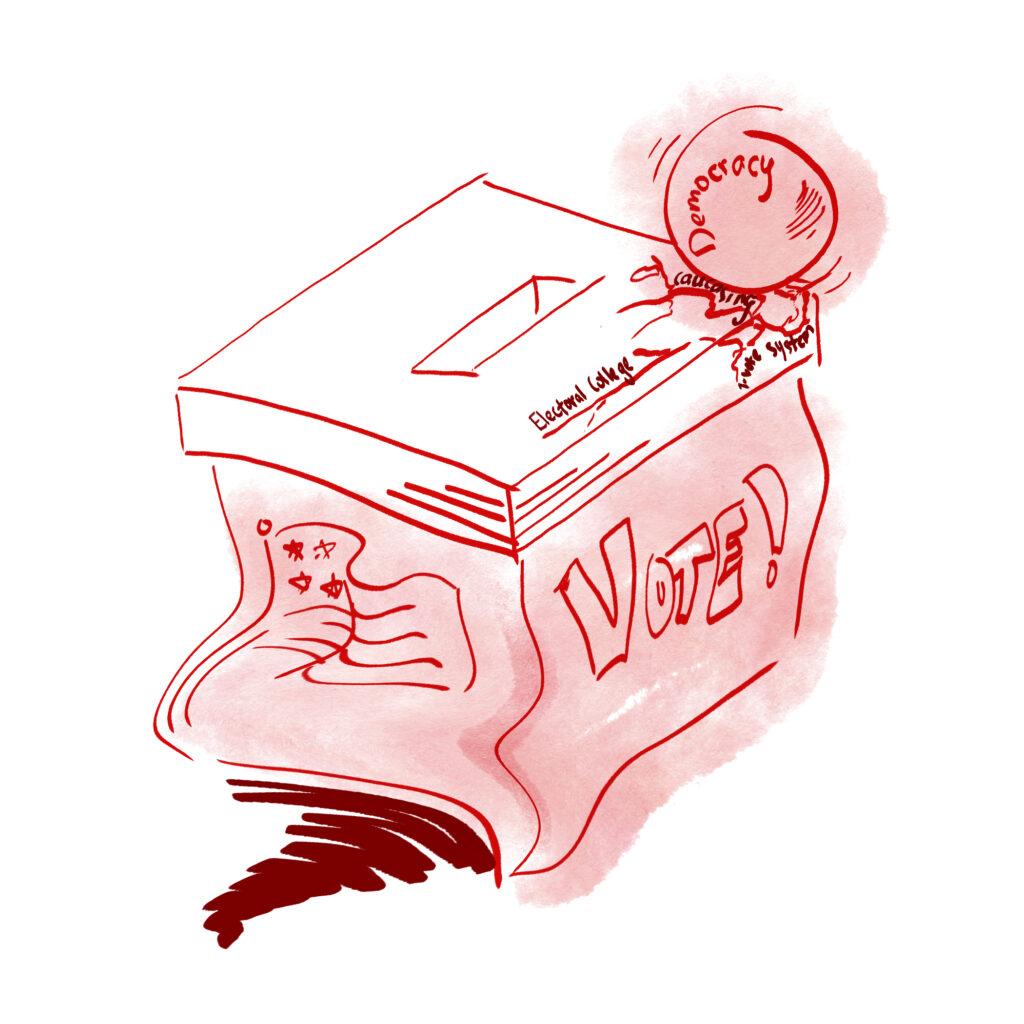The 2024 presidential election is approaching, bringing with it a Biden-Trump rematch. This close matchup between the incumbent and previous president is revealing the seismic cracks in America’s electoral system.
The one-candidate ballot undermines candidates who would otherwise be a good second or third choice; the Electoral College, which allots a whole state’s electors as bloc to the winning candidate, means the presidential race comes down only to six or seven battleground states, utterly ignoring the popular vote; and caucusing — like the Iowa Caucus that kicks off the election year — gives an extreme representation of the rest of the country’s demographics and core issues.
It’s time for the country as a whole to look toward other voting systems, such as ranked-choice voting, as a replacement for the Electoral College.
The “only-one-candidate” ballot favors “electable” candidates
The system of allowing voters only one vote to cast puts an additional, irrelevant factor for voters to consider — electability — not the candidate’s policies or personality, but their predicted chance of winning against the opposing party’s nominee.
This November, one Democratic and one Republican candidate will clash, and voters will have the choice between the two, or may vote for a third-party candidate — someone who, realistically, has no chance of winning. From 1892-2022, the only third-party candidate to gain more than 10% of the electoral votes was former president Theodore Roosevelt in 1912, with 16.57% as part of the Bull Moose Party — nowhere near the number of votes needed to win. In fact, America hasn’t elected an independent candidate since George Washington.
Effectively, third-party candidates take away votes that would otherwise have gone to major party candidates. In other words, these candidates have the ability to tip election results one way or the other, as they did in 2000, when Pat Buchanan drew voters away from Al Gore and tilted Florida toward George W. Bush and his narrow Electoral College victory.
This year, although a record number — 63% of voters — say they would prefer a third-party candidate, only 17% say they would actually vote for one. And those 17% are evenly divided, so as voters face an unpopular rematch between Biden and Trump, third-party voting may factor into the final outcome. Although it is an idealistic demonstration of democratic principles, in America’s voting system, casting ballots for third-party candidates is essentially throwing away your vote and possibly helping your lesser-liked candidate win.
Furthermore, the issue of electability has historically undermined female candidates in presidential elections. Although it is not a focus for Republicans in 2024, a poll in 2020 suggests that many voters skew their votes away from female candidates because they believe that they have lower chances of leading the winning party — with 76% of Democratic respondents stating that they believed it would be more difficult for a female candidate to beat Trump.
The Electoral College strays too far from the popular vote
But perhaps an even more self-evidently flawed institution is America’s Electoral College system. The vote counting system is out-of-date and historically fails to accurately represent the popular vote; five of 46 presidents have been elected with a win in the Electoral College, but a loss in popular vote — since all states also get a minimum three electoral votes, small states like Wyoming are given a disproportionately large weight in elections, in comparison to their population. (Wyoming’s population is 600,000 compared to the nearly 40 million Californians.)
In addition, according to Pew Research Center, the Electoral College stimulates an effect called electoral vote inflation — where, on average, the difference in Electoral College votes is 1.36 times greater than the difference in popular votes.
In all but two states, there are winner-takes-all elections: Whichever candidate wins a majority of the popular vote in a state is awarded all the electoral voting power that state has, essentially discarding every vote for the losing candidate.
The only benefit of the Electoral College is that the winning candidate will always have a simple majority of electoral votes, in comparison to popular voting — but this also means that third-party candidates winning a state’s electoral votes is statistically near-impossible, with only three candidates in the past 100 years having ever won even one state.
And if a presidential candidate without the greatest number of popular votes can win through a distorted majority, how can we claim that this is the best voting system?
A possible solution: ranked choice voting and primaries instead of one vote per person and caucuses
Given the Electoral College’s problematic one-person one-vote system, ranked choice voting, a system where voters rank all presidential candidates — so that if their candidate is eliminated, their vote is immediately given to their next choice — is an option worth considering.
Although ranked-choice voting (RCV) may be more complex for voters and tends to benefit white, affluent voters, it has a few standout strong suits. In theory, it has the potential to decrease polarization and “spoiler votes” by forcing candidates to appeal to a wider audience rather than a singular, strong, like-minded base (think of Trump’s MAGA movement). RCV may also encourage turnout for voters who would rather abstain than vote for either major party candidate.
Then, those votes can be used as popular votes, bypassing the Electoral College system.
Lastly, caucusing states should switch to conducting primaries rather than caucuses, which are in essence unproductive shouting sessions for already polarized voters, who have the time and job security to dedicate an entire evening to yelling supporting points for their candidate, into the opposing masses of feverishly screaming people.
In order to prevent the nomination of extreme candidates who do not truly have the support of a majority of Americans, America’s voting system needs to change.



























